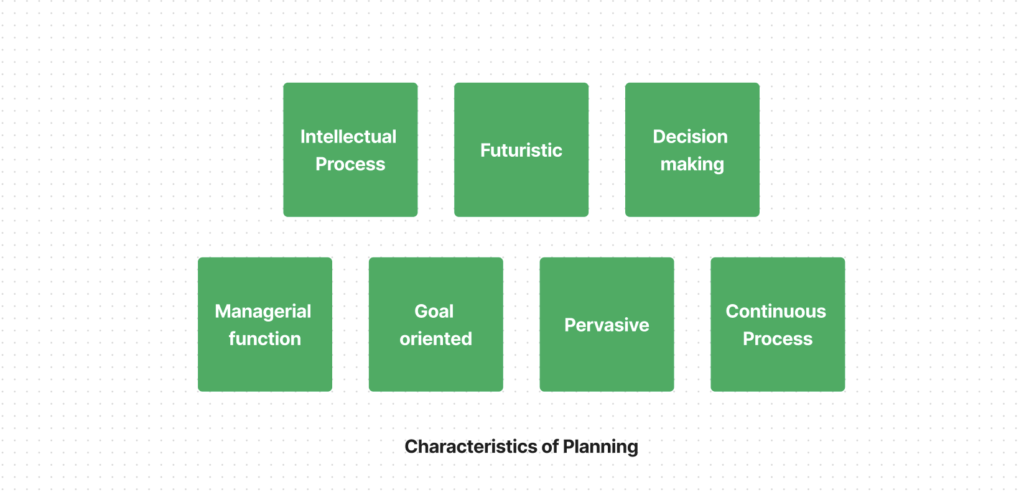Table of Contents
In this article, we learn about What is Planning, Definition, Characteristics, and Objective.
Planning may be defined as deciding in advance what to be done in the future. It is the process of thinking before doing. It involves the determination of goals as well as the activities required to be undertaken to achieve the goals.
In the planning, process managers anticipate the future and accordingly decide what activities must be undertaken. Planning deciding in advance – What to do, How to do, When, and by whom.

Definition of Planning
“Planning means the determination of what is to be done, how it is to be done, who is to do it, and how results are evaluated.”
James Lundy
“Planning is deciding the best alternatives among others to perform different managerial operation in order to achieve the predetermined goals.”
Henry Feyol
Characteristics of Planning

- Managerial function: Planning is a first and foremost managerial function provides the base for other functions of the management, i.e. organising, staffing, directing and controlling, as they are performed within the periphery of the plans made.
- Goal oriented: It focuses on defining the goals of the organisation, identifying alternative courses of action and deciding the appropriate action plan, which is to be undertaken for reaching the goals.
- Pervasive: It is pervasive in the sense that it is present in all the segments and is required at all the levels of the organisation. Although the scope of planning varies at different levels and departments.
- Continuous Process: Plans are made for a specific term, say for a month, quarter, year and so on. Once that period is over, new plans are drawn, considering the organisation’s present and future requirements and conditions. Therefore, it is an ongoing process, as the plans are framed, executed and followed by another plan.
- Intellectual Process: It is a mental exercise at it involves the application of mind, to think, forecast, imagine intelligently and innovate etc.
- Futuristic: In the process of planning we take a sneak peek of the future. It encompasses looking into the future, to analyse and predict it so that the organisation can face future challenges effectively.
- Decision making: Decisions are made regarding the choice of alternative courses of action that can be undertaken to reach the goal. The alternative chosen should be best among all, with the least number of the negative and highest number of positive outcomes.
Planning is concerned with setting objectives, targets, and formulating plans to accomplish them. The activity helps managers analyze the present condition to identify the ways of attaining the desired position in the future. It is both, the need of the organization and the responsibility of managers.
Objective of planning
- Reduce uncertainty: Future is uncertain. Planning may convert the uncertainty into certainty. This is possible to some extent by, planning which is reducing uncertainty.
- Bring cooperation and co-ordination: Planning can bring co-operation and co-ordination among various sectors of the organization. The rivalries and conflicts among departments could be avoided through planning.
- Economy in operation: As already pointed out, planning selected best alternative among various alternatives this will lead to the best utilization of recourses. The objectives of the organization are achieved easily.
- Anticipate the unpredictable contingencies: Some events could not be predictable. These events are termed as contingencies. These events may affect the smooth functioning of an enterprise.
- Achieving the pre-determined goals: Planning activities are aimed at achieving the objectives of the enterprise. The timely achievements of objectives are possible only effective planning.
- Reduce competition: The existence of competition enables the enterprise to get a chance for growth. At the same time, stiff competition should be avoided. It is possible, to reduce competition through planning.
Planning is present in all types of organizations, households, sectors, economies, etc. We need to plan because the future is highly uncertain and no one can predict the future with 100% accuracy, as the conditions can change at any time. Hence, planning is the basic requirement of any organization for survival, growth, and success.
